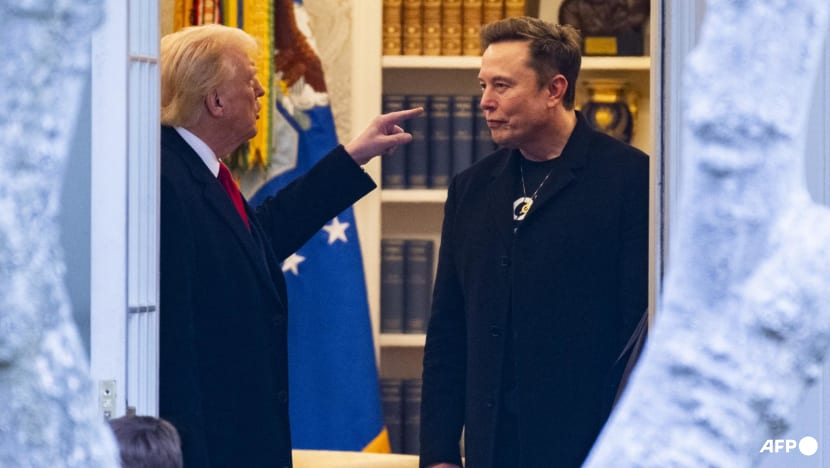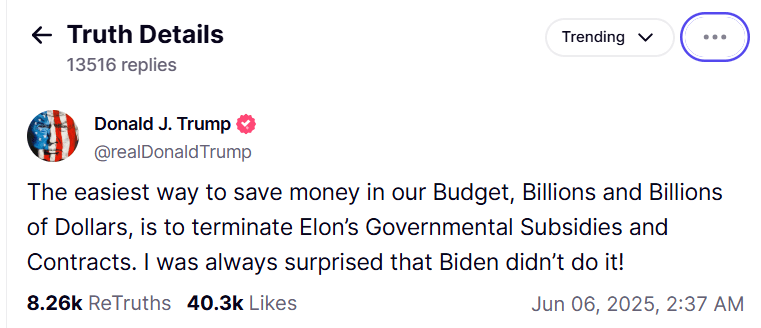Commentary: The cost of a Trump-Musk divorce could be national
The very public falling-out between US President Donald Trump and the world’s richest man, Elon Musk, carries risks for both men. SUSS’ Ben Chester Cheong weighs in.

US President Donald Trump speaks with Elon Musk (right) before departing the White House on his way to his South Florida home in Mar-a-Lago in Florida on Mar 14, 2025. (File photo: AFP/Roberto Schmidt)

This audio is generated by an AI tool.
SINGAPORE: Once inseparable, United States President Donald Trump and the world’s richest man, Elon Musk, are now locked in a very public - and very bitter - divorce.
In a matter of days, Mr Musk torched Mr Trump’s signature "big, beautiful" Bill, condemned his spending plans, threatened to form a new political party and even suggested the president be impeached.
Mr Trump retaliated in kind. He called Mr Musk “a big-time drug addict”, threatened to cut his companies off from government contracts and warned of “serious consequences” if the billionaire were to finance Democratic Party candidates running against Republicans.
"I have no intention of speaking to him," Mr Trump told NBC on Saturday (Jun 7), saying he believed their relationship was over.
Unlike most public spats between public figures, this one offers no easy side to take. The two men are, in many ways, cut from the same cloth. They operate with little patience for deliberation and considerable appetite for the spotlight, and are accustomed to getting their own ways.

A PERSONAL FIGHT WITH NATIONAL CONSEQUENCES
The trouble with breakups is that any fallout doesn’t stay between the warring parties. There’s always collateral damage. For example, after Mr Trump threatened to pull government deals with Mr Musk’s companies, Tesla shares tanked 14 per cent and lost US$150 billion in value.
This very public falling-out carries risks for both men.
For Mr Trump, the feud with Mr Musk marks the first major rift with a prominent adviser in his second term. It has shattered the “bromance” that many assumed would continue and could fracture Mr Trump’s support among tech leaders and wealthy donors.
Mr Musk, who spent nearly US$300 million in last year's elections, was not only Mr Trump’s richest backer, but also a key bridge to Silicon Valley. He helped connect Mr Trump to tech investors and gave the pro-business wing of the Republican Party reason to support the president.
Now, Mr Musk’s defection could undermine Republican unity on Capitol Hill. His vocal criticism of the debt impact has emboldened some Republican fiscal hawks to oppose Mr Trump’s One Big Beautiful Bill Act, which passed the US House late last month.
The Bill, which combines tax breaks, spending cuts, border security funding and other priorities, is the centrepiece of Mr Trump's domestic policy agenda. Critics, however, have said it could increase the deficit by as much as US$4 trillion over a decade.
If it falters in the Senate due to Republican defections, it would be a significant blow to Mr Trump’s legislative agenda.
Moreover, Mr Musk’s talk of a new centrist party and his massive online influence hint at a potential challenge to the two-party status quo, which should alarm Republican strategists.
Although an actual third party is a long shot, even the suggestion feeds a narrative that Mr Trump’s brand of Republicanism is alienating a segment of his base. A prolonged Trump-Musk feud could make it harder for Republicans to hold Congress in next year’s midterms, given Mr Musk’s financial clout and devoted following.
FEUD SPREADS TO SPACE
Mr Trump, for his part, appears eager to show he won’t be dictated to by a billionaire ally. A White House official stressed that the administration is “not beholden to Elon Musk on policy” and that by attacking the Bill, Mr Musk “has clearly picked a side” against Mr Trump.
In the short term, Mr Trump’s hardline stance may shore up his image as a president who puts his agenda above any one person, even the world’s richest man. His core base, many of whom harbour scepticism toward tech elites, might even cheer him for standing up to Mr Musk.
However, Mr Trump’s unpredictable retaliatory streak raises questions in Washington and on Wall Street. Would he really cut off federal contracts to SpaceX and Tesla to punish Mr Musk, even if it jeopardises US interests? NASA and the Pentagon rely heavily on SpaceX for America’s spaceflight capabilities and military satellite launches.
Pulling the plug on SpaceX partnerships could set back crucial programmes (like the International Space Station transport, Moon missions and defence satellite deployments) and force the government to scramble for alternatives.
It’s an open question how far Mr Trump is willing to go. Even some within Mr Trump’s circle may urge caution, given the billions at stake and the fact that SpaceX's Dragon spacecraft is integral to US-led space efforts (NASA has invested roughly US$15 billion in SpaceX projects). So, while the president talks tough, cutting Mr Musk off is not without consequences.
Rattled by Mr Musk’s initial threat to retire the Dragon spacecraft, NASA and Pentagon officials have contacted at least three competitors - Rocket Lab, Stoke Space and Blue Origin - to assess their rocket development and availability for government missions, according to a report by the Washington Post over the weekend.
CAN MUSK AFFORD TO ALIENATE WASHINGTON?
For Mr Musk, this episode is a high-stakes gamble that could redefine his role in the tech and political ecosystems.
On one hand, Mr Musk has rebranded himself as an independent voice, unafraid to challenge a president he once supported. This could salvage his reputation among moderates or Tesla customers who were uneasy with his closeness to Mr Trump.
By distancing himself from Mr Trump, Mr Musk may refocus attention on his companies’ innovations rather than partisan politics. He has already said he will curtail political spending going forward, signalling a retreat from the kingmaker role he played in 2024.
On the other hand, Mr Musk is now on a collision course with the US government that could have serious business implications.
If Mr Trump were to follow through on cancelling contracts, SpaceX stands to lose enormous revenue (an estimated US$22 billion in government deals is now at risk).
Mr Musk must also consider the broader impact on Tesla, which until now has benefited from government electric vehicle (EV) incentives and a friendly regulatory environment. If Mr Trump now views Mr Musk as an adversary, Tesla could face a chillier reception in policy areas important to it (such as environmental credits, infrastructure support or foreign trade deals).
AN EXPENSIVE BREAKUP
What happens next is very much anyone’s guess; it could well depend on what either man decides to post next.
The Trump-Musk fallout has escalated from a policy disagreement into a personal and political reckoning.
Mr Trump is defending his legislative legacy and asserting authority over a defiant former ally. Mr Musk is recasting himself as an independent visionary, willing to challenge power, but at the cost of political access.
Whether this fades or hardens, the consequences will be felt well beyond Washington.
Ben Chester Cheong is a law lecturer at the Singapore University of Social Sciences, and of counsel at RHTLaw Asia. He is a visiting fellow in law at the University of Reading, and a centre researcher at the University of Cambridge.
















